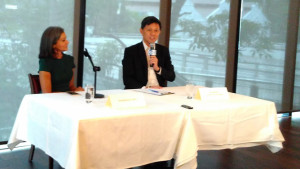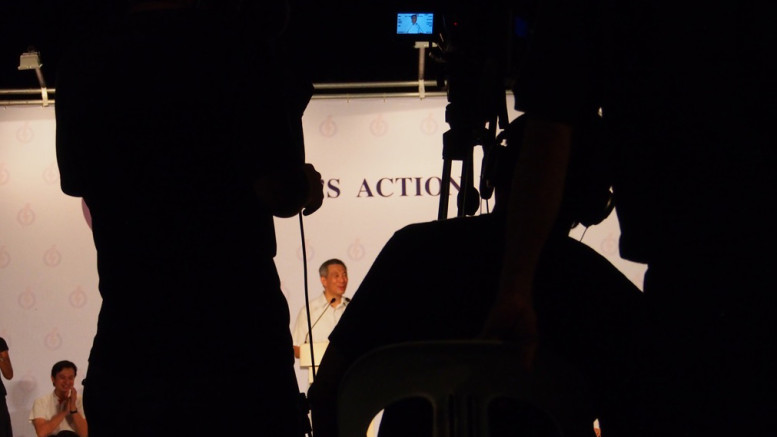By CHERIAN GEORGE
April 3, 2019
In selling its new Online Falsehoods Bill, the government says it needs new powers to act against disinformation that could sow division and even incite violence among Singapore’s ethnic groups. This is a risk that most Singaporeans worry about.
In practice, however, the government’s interventions in media often focus on streamlining coverage of its own words and actions — in news and opinion pieces that have nothing to do with the sensitive issues of race and religion. How would the proposed law apply to such cases? The Bill isn’t limited to disinformation campaigns that undermine race relations or the integrity of elections. It also targets misleading information that could diminish its own standing [see Section 4 (f) of the Bill, or my analysis of key sections here].
For a complete list of my writings on this topic, please visit my home page.
A historical test case
The government’s tiff with a news agency 18 months ago is an interesting real-life test case that can clarify whether and how the Act might affect the work of journalists.
In October 2017, the government accused Reuters of publishing a “fabricated headline”, adding that the global news agency was irresponsible to “fabricate quotes like this”.
If Reuters was guilty of fabrication, it can only mean that it was communicating a “false statement of fact”, and deliberately at that, which is precisely what the Act is meant to stop.
MPs should ask the government to state categorically whether it would have found the news agency in violation of the Act if it had been in force at the time. If so, which specific provision would it have used against the source? A criminal prosecution under Section 7? Or a Part 3 Correction Direction, or a Stop Communication Direction?
Reuters is a global corporation that can look after its interests without our help. (And its quarrel with Singapore must have been a minor irritation in the larger scheme of things: it was carrying out vital investigative work in Myanmar that would result in the detention of two of its journalists, Wa Lone and Kyaw Soe Oo, six weeks later.)
But we in Singapore owe it to ourselves to scrutinise the potential scope of the Act, which is why it’s worth revisiting the Reuters incident.
Here’s the background.
At a dialogue with foreign correspondents, Sharanjit Leyl of the BBC asked cabinet minister Chan Chun Sing a direct question – whether he would like to be the next Prime Minister.

His coy answer: “All of us have to be prepared to do the job when called upon.”
Local media interpreted Chan’s response as a non-answer.
Reuters interpreted it differently. It ran the story with the headline “Chan Chun Sing says he is prepared to be next Prime Minister when called upon”. The story paraphrased his quote to mean “he is prepared to become next PM if called upon”.
Logically, Chan had to be part of the “we” that he declared to be prepared to do the job. Since he was asked specifically about himself, it was surely reasonable (even if inaccurate) to assume he was talking about himself, and that he perhaps used “we” self-effacingly, to indicate that he was no different from his peers in this respect.
If reporters asked Joe Biden today, “Do you want to run for President?” and he replied, “All of us have to be prepared to do the job when called upon”, you can bet that the world’s media would report it within 10 seconds as “Biden says he’s prepared to run” and nobody – least of all Biden – would consider that to be a misinterpretation, let alone a fabrication.
But the Ministry of Communications and Information (MCI) released a statement to media that very night, saying that the news agency had run “a fabricated headline alleging Minister Chan Chun Sing had said he is prepared to serve as PM”. MCI said Chan had been referring to the entire fourth generation leadership, and not to himself. MCI added: “It is irresponsible of a wire agency like Reuters to fabricate quotes like this.”
This verdict wasn’t some throwaway remark made in a doorstop interview, but a written statement from the government. The timing is also worth noting. The government had already announced its intention to regulate “fake news”. So it is inconceivable that its accusation was totally unconnected to the government’s concerns about fake news.
The connection was certainly not lost on the Five Stars and Moon blog, one of the PAP’s online attack-dogs and a good barometer of reactionary sentiment within the PAP. The same day the MCI statement was released, the blog said of the Reuters report: “That’s vague news. That’s as bad as fake news and perhaps even worse because it is evidence of media tampering, bias and agenda. One must then ask what agenda does Reuters and Yahoo have by making employing tactics of Vague news.”
The next day, Reuters amended its headline to read: “Singapore minister says he, and his colleagues, all prepared to become next PM if called upon”. The lead was rewritten to refer to “he and his colleagues”.
One local blogger probably had the best interpretation of the kerfuffle:
“It seems that Mr Chan’s time as an army regular has equipped him with survival skills to navigate the path to be Singapore’s next Prime Minister. One such skill would be to show interest, but not too much that it appears over-zealous. That’s because when he was asked if he would like to be the next Prime Minister of Singapore, Mr Chan simply turned it into a warning that he and his colleagues have to be ready if they are chosen to lead the country.” – Nevin Khoo
So the real problem with the Reuters report was that it wasn’t sensitive to the PAP’s corporate culture and Chan’s need to “show interest, but not too much that it appears over-zealous”.
Taking into account what we know now — that there was internal disagreement about succession — it’s also possible that Chan’s reported response upset colleagues who either felt he was jumping the gun, or that the world’s media were declaring a winner prematurely.
At worst, Reuters was guilty of not grasping the cultural intricacies of the PAP’s internal politicking.
Back to the future
The government now wants the power to punish and/or compel corrections/take-downs of deliberate falsehoods.
It says that there is a patently clear and obvious distinction between false statements of fact and other types of disagreeable expression that won’t be covered by the law.
If the distinction is clear, the government should have no trouble stating categorically whether the Reuters headline and quote would have been treated as a false statement of fact (which its statement at the time indicates); and if so, how the Online Falsehoods Act would have been used.
I hope we get the unambiguous reassurance that such a case would not be subject to the proposed law, and that the Bill will be amended to close any loophole permitting a future government to use it in this way.
If we can’t get that reassurance, at least we’ll have a better idea about the new limits for journalism in Singapore. Whatever the answer, the question needs to be asked.
- See my Google Doc on the Bill’s provisions here.


Be the first to comment on "How would the Online Falsehoods Act affect journalism? This test case could give an answer."